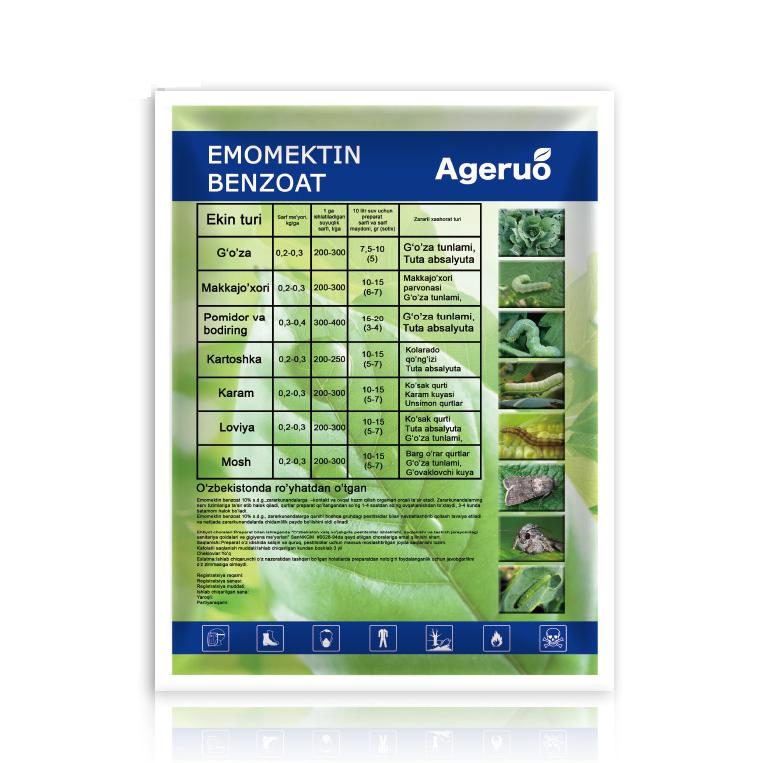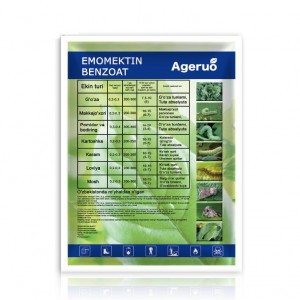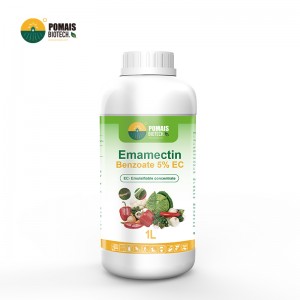Products
POMAIS Emamectin Benzoate Insecticide 5%SG GR 5% 10%WDG 70%TC 1.9%EC
Introduction
Emamectin Benzoate 5% WDG is a high-performance biological insecticide developed to deliver rapid and long-lasting control of Lepidoptera, mites, and selected Coleoptera pests. This water-dispersible granule formulation offers powerful stomach and contact activity, helping to stop pest feeding within hours and causing death within 2 to 4 days.
Ideal for vegetables, fruit trees, cotton, and other economically important crops, this formulation combines ultra-low toxicity, minimal environmental residue, and resistance-breaking power. Whether you're targeting diamondback moths, armyworms, or cotton bollworms, Emamectin Benzoate 5% WDG provides consistent field performance under diverse climatic conditions.
Designed for professional agricultural use, this product supports private label packaging, multi-language customization, and international regulatory compliance.
Related reading: Emamectin Benzoate vs. Imidacloprid
| Product Name | Emamectin Benzoate5%WDG |
| CAS Number | 137512-74-4 |
| Molecular Formula | C49H77NO13 |
| Type | Insecticide |
| Brand Name | POMAIS |
| Place of Origin | Hebei,China |
| Shelf life | 2 Years |
| The mixed formulatiion products | Emamectin benzoate0.2%+Cypermethrin3% MEEmamectin benzoate0.5%+Beta-cypermethrin4.5% SC |
| Dosage Form | Emamectin benzoate5% WDGEmamectin benzoate5% ECEmamectin benzoate3.6% EC |
How Emamectin Benzoate Works
Emamectin Benzoate is a non-systemic biological insecticide derived from avermectins. It exerts its insecticidal effect by activating chloride channels in the insect nervous system, specifically by enhancing the binding of glutamate to glutamate-gated chloride channels. This causes irreversible paralysis, leading to the cessation of feeding within hours and death within two to four days.
While not systemically translocated, Emamectin Benzoate penetrates leaf tissues through translaminar movement, making it highly effective against pests that hide on the underside of leaves or feed internally. Its dual mode of action—stomach poisoning and contact activity—provides rapid knockdown and extended control.
Due to its high affinity for pest neuroreceptors and extremely low application rate, Emamectin Benzoate is known for exceptional potency against Lepidoptera, including species resistant to conventional insecticides.
Target Crops & Insects
Emamectin Benzoate 5% WDG is highly effective across a wide spectrum of crops and delivers outstanding performance against key economic pests, particularly Lepidoptera, mites, and selected Coleoptera.
Applicable Crops:
-
Vegetables: Cabbage, tomato, pepper, eggplant, beans
-
Fruits: Apple, pear, citrus, grape, mango
-
Field crops: Cotton, tobacco, maize
-
Other: Tea, sugar beet, ornamental plants
Its translaminar activity allows the product to reach pests feeding on the underside of leaves or within plant tissues, ensuring control even in dense canopies.

Key Pests Controlled:
-
Lepidoptera: Diamondback moth (Plutella xylostella), cotton bollworm (Helicoverpa armigera), armyworms (Spodoptera spp.), cabbage looper, tomato fruit worm, sugar beet leaf moth
-
Mites: Red spider mite, broad mite
-
Beetles: Colorado potato beetle (Leptinotarsa decemlineata)
-
Others: Leafrollers, hornworms, cabbage borer
The product is particularly valued for its efficacy on pest populations that have developed resistance to organophosphates, pyrethroids, or carbamates, making it a dependable option in rotation programs.
Application & Dosage
Emamectin Benzoate 5% WDG is formulated for foliar spray application, delivering fast and reliable pest control when applied during early infestation stages. Its granule form dissolves easily in water, ensuring uniform coverage across the crop canopy.
General Application Guidelines:
| Crop | Target Pest | Dosage (g/ha) | Application Method |
|---|---|---|---|
| Cabbage | Diamondback moth | 7–10 | Foliar spray |
| Cotton | Cotton bollworm | 8–12 | Foliar spray |
| Tomato | Leafrollers, hornworms | 10–15 | Foliar spray |
| Tea | Tea looper, red spider mite | 7–10 | Foliar spray |
| Apple/Pear | Fruit borer | 10–15 | Foliar spray |
Note: Always adjust the dosage based on local pest pressure, crop growth stage, and climatic conditions. Apply during early morning or late afternoon to avoid high temperatures and UV degradation.
Best Practices:
-
Use sufficient water volume to ensure thorough coverage, especially on the underside of leaves
-
Avoid application during rainy or windy conditions
-
Maintain a minimum interval of 7 days between consecutive applications
-
Use clean water with neutral pH to preserve formulation integrity
-
Rotate with other insecticide classes to reduce resistance risk
Formulation Options
While Emamectin Benzoate 5% WDG remains the most widely adopted formulation due to its convenience, efficacy, and safety, POMAIS also offers a full range of alternative formulations to suit various application technologies and regional preferences.
Available Formulations:
-
5% WDG (Water Dispersible Granule):
Ideal for foliar spraying in vegetables, fruits, and cotton. Offers excellent suspensibility, ease of mixing, and low drift. Preferred for precision farming and greenhouse operations. -
1.9% EC (Emulsifiable Concentrate):
Suitable for use in open-field crops. Requires careful handling but offers strong penetration and spreading capability. Often used in combination treatments. -
10% WDG:
Higher concentration version for large-scale operations or high-resistance zones. Enables reduced packaging volume and extended storage efficiency. -
5% SG (Soluble Granule) and GR (Granules):
Tailored for niche markets with specific application needs (e.g., soil treatment or aerial broadcasting). -
70% TC (Technical Concentrate):
Supplied for formulation partners and industrial processing. Requires further dilution or formulation before use.
Each formulation is developed with field performance, operator safety, environmental impact, and regulatory compliance in mind, ensuring that you have the right product for the right environment.
Tank Mix Compatibility & Resistance
Emamectin Benzoate 5% WDG is highly versatile and can be safely combined with a wide range of agrochemicals, making it suitable for integrated spray programs and season-long pest control strategies.
Tank Mix Compatibility:
-
Compatible with most fungicides, insecticides, and foliar fertilizers commonly used in vegetable, fruit, and cotton production
-
Performs well in tank mixes with pyrethroids, organophosphates, and insect growth regulators (IGRs)
-
Avoid mixing with strongly acidic or alkaline solutions, mineral oils, or copper-based products without a prior jar test
For best results:
-
Use clean, pH-neutral water
-
Mix and apply immediately after dilution
-
Agitate continuously during spraying
Role in Resistance Management:
-
Belongs to IRAC Group 6, offering a distinct mode of action from neonicotinoids and pyrethroids
-
Effective against many pest species resistant to organophosphates, carbamates, and synthetic pyrethroids
-
Ideal for use in rotation programs, helping reduce resistance pressure and prolong the effectiveness of existing chemistries
By integrating Emamectin Benzoate 5% WDG into a well-planned IPM (Integrated Pest Management) strategy, you can optimize pest suppression, minimize chemical usage, and support long-term field sustainability.
Toxicology & Environmental Behavior
Emamectin Benzoate 5% WDG is classified as a biologically derived insecticide with ultra-low toxicity to mammals and a favorable environmental profile, making it suitable for use in integrated and sustainable farming systems.
Toxicology Profile:
-
Toxicity Classification: WHO Class III (slightly hazardous)
-
Oral LD₅₀ (rats): >2000 mg/kg (low acute toxicity)
-
No observed carcinogenic, mutagenic, or teratogenic effects in long-term studies
-
Safe to apply with standard PPE under field conditions
-
Field re-entry interval: typically 24 hours or as regulated locally
Environmental Behavior:
-
Translaminar but not systemic, minimizing groundwater contamination risk
-
Rapidly degrades in soil and on plant surfaces through photolysis and microbial activity
-
Exhibits low bioaccumulation potential in non-target organisms
-
Rainfast within 2–4 hours of application under normal conditions
-
Apply outside of bee foraging hours and avoid during bloom to reduce pollinator exposure
This balance of high pest specificity and low environmental persistence allows Emamectin Benzoate to fit into eco-conscious crop programs while still delivering robust field performance.
Packaging & OEM Services
To meet diverse market requirements, POMAIS offers a range of packaging options for Emamectin Benzoate 5% WDG, suitable for both wholesale distribution and branded retail lines.
Standard Packaging Options:
-
Aluminum foil pouches: 100g, 250g, 500g, 1kg
-
Fiber drums or cartons: 5kg, 10kg
-
All packaging is moisture-proof and heat-sealed for stability and safety
OEM Capabilities:
-
Multi-language label design and printing
-
Custom packaging formats and branding support
-
Technical document assistance for registration and compliance
-
Flexible MOQs and production schedules
Whether you’re an importer, national distributor, or brand owner, we help you bring high-quality products to market efficiently and reliably.
Why Choose POMAIS
At POMAIS, we focus on delivering reliable pesticide solutions tailored to the needs of international buyers. With a dedicated production line for Emamectin Benzoate formulations, we offer:
-
Consistent product quality backed by ISO-compliant manufacturing and strict QC systems
-
Flexible customization for labels, packaging, and formulation specifications
-
Global export experience, serving importers, distributors, and agrochemical brands across Asia, Africa, Latin America, and the Middle East
-
Registration support with full technical documentation, including COA, MSDS, ICAMA, and GLP reports
-
A responsive team that ensures timely communication, fast sampling, and efficient shipment
We are committed to helping you expand your product line with cost-effective, high-quality formulations that meet market demands and regulatory requirements.
FAQ
1. What pests does Emamectin Benzoate 5% WDG control?
It is highly effective against Lepidoptera pests such as diamondback moth, cotton bollworm, armyworms, and hornworms, as well as mites and some beetles like the Colorado potato beetle.
2. Can Emamectin Benzoate be used on fruits and vegetables?
Yes. It is widely used on vegetables (such as cabbage, tomatoes, and beans), fruit trees (like citrus, apples, and grapes), and other crops like cotton and tea.
3. Is Emamectin Benzoate safe for beneficial insects and pollinators?
When applied as directed, it has low impact on beneficial insects. To protect pollinators, avoid spraying during peak foraging times and blooming periods.
4. Can I mix it with other pesticides?
Yes. It is compatible with most commonly used fungicides, insecticides, and foliar fertilizers. Always conduct a small-scale jar test before tank mixing.
5. What is the recommended dosage and how is it applied?
Dosage ranges between 7–15 g/ha depending on the crop and pest. It should be applied via foliar spray, ensuring full coverage, especially on the underside of leaves.
6. Do you support registration in export markets?
Yes. We provide all necessary documents including COA, MSDS, ICAMA certificate, and GLP reports to support product registration in your country.
























